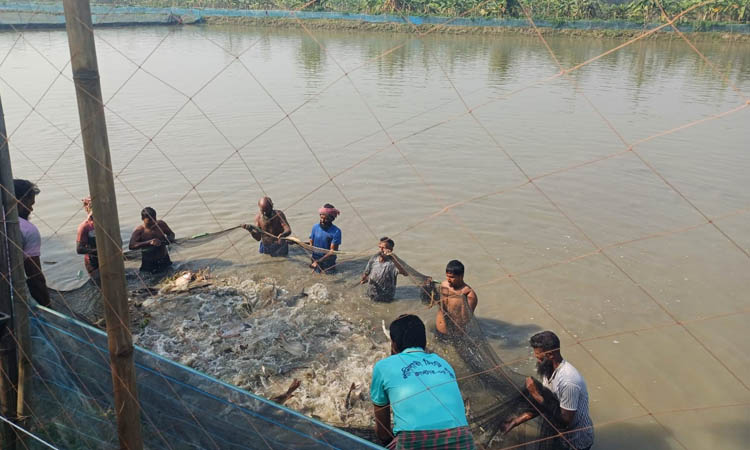News Flash
News Flash

By S M Zahid Hossain
KHULNA, Aug 29, 2025 (BSS) - Monir Molla, 53, a resident of Dighalia village under Dighalia upazila in Khulna, has transformed his life through cluster-based fish farming, emerging as a role model for local aquaculture entrepreneurs.
Once struggling with poverty, Monir has embraced modern scientific aquaculture methods to turn his fortunes around, inspiring other farmers in the region to follow suit.
Speaking to BSS, Monir said he had been engaged in traditional fish farming for years but earned little profit. "Following the advice of the upazila fisheries officer, I adopted the cluster farming method, where a group of farmers cultivates fish jointly in a designated area using scientific techniques," he said.
He explained that the method reduces costs while increasing production. "Although I was initially skeptical, I can now confidently say that cluster-based fish farming is both profitable and sustainable," Monir added.
Currently, his fish enclosures feature carp species such as rui, katla and mrigel, generating several lakh taka in annual income. Beyond supporting his family, he has created employment opportunities for local youths involved in feeding, maintaining, and harvesting fish.
Monir completed his graduation in 1992 from Daulatpur Day-Night College and initially worked at a coaching center.
Married in 1988, he struggled to support a family of four. Later, he joined Grameen Bank at Thakurgaon but still could not make ends meet for a growing family of six.
In 2006, he left his job to focus on fish and vegetable farming on his 100-decimal plot, investing an initial Tk 1 lakh borrowed from Krishi Bank. Today, his investment has grown to around Tk 50 lakh, partly funded through Krishi and Sonali Bank loans.
"Currently, I earn an annual profit of Tk 7 to 8 lakh from an investment of Tk 2.5 to 3 lakh on my land," he said, noting that a group of 25 farmers now cultivates a total of 1,978 decimals (19.78 acres) using the cluster method.
Monir credited fisheries officers for their training, which helped him successfully cultivate shrimp using the cluster system, doubling production compared to earlier methods.
He added that the Department of Fisheries (DoF) provided a matching grant to prepare 25 enclosures, further boosting productivity.
According to the Dighalia Upazila Fisheries Office, cluster farming reduces disease risks, simplifies management and ensures better market opportunities, improving farmers' financial stability.
Under the Sustainable Coastal and Marine Fisheries Project, a cluster of 25 farmers was formed, with Md. Monirul Islam as president. The farmers invested in pond excavation and bio-security measures, while the government contributed nearly Tk 50 lakh and provided training.
Over the past three years, the cluster method has significantly increased shrimp yields, from 1.5-2 kg per decimal to 4-5 kg per decimal.
Local residents say Monir's success has motivated many others to adopt cluster farming, boosting economic growth in the area. Other farmers, including Ashraf Mia, Ruhul Amin, and Sazed Howlader, have also become self-reliant through cluster shrimp farming.
Upazila Senior Fisheries Officer Snigdha Kha Bably told BSS, "If more entrepreneurs like Monir adopt cluster-based fish farming, national fish production will rise, positively impacting the economy."
Upazila Nirbahi Officer (UNO) Ariful Islam added, "Monir's success proves that with hard work, modern technology and proper guidance, rural communities can achieve self-reliance."
Prof Lifat Rahi of Khulna University's Fisheries and Marine Resource Technology department said the cluster method has nearly doubled yields for shrimp farmers in recent years. Previously, conventional shrimp farming often caused losses due to shrimp mortality, water salinity, climate change, and disease.
Abdullah Al Mamun, Project Director of the Sustainable Coastal and Marine Fisheries Project, said 297 clusters, each with 25 enclosures ranging from 33 to 150 decimals, have been formed in 29 upazilas across Khulna, Bagerhat, Satkhira, Jessore and Gopalganj. A total of 7,378 shrimp farmers, including 1,622 women, are now organized into these clusters.
Jahangir Alam, Divisional Deputy Director of the DoF, said the cluster system is a modernized shrimp farming method, providing funding only to clusters that meet technical requirements.
During a 2018 baseline survey, Golda shrimp production was 623 kg per hectare and Bagda 323 kg. With the cluster approach, productivity has improved substantially, offering hope for a more sustainable and profitable future for farmers in the Khulna region.